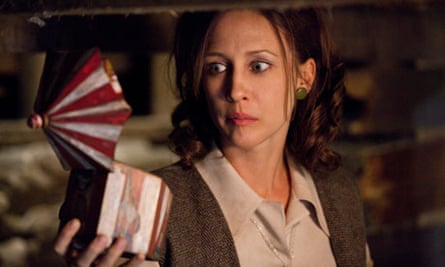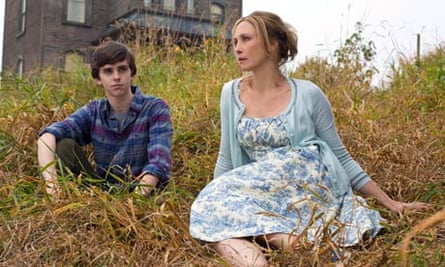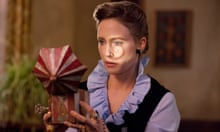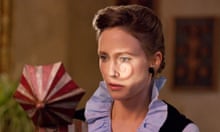Last night Vera Farmiga watched her new movie, a cheerfully manipulative and highly effective shocker, with an audience for the first time. "To me the masculine screams were a riot," she says. "They were just unabashed. Usually there's a self-awareness to male laughter, an apologetic giddiness, but not here. That was a different kind of screaming – unprompted, like the sounds were being ripped out of them. And I'd seen the movie before, so I knew when to look at the audience instead of the screen. Just every time – 'Aaaarrgghh!'" That effort reignites her cough. The chuckles become hacking little rasps, and she guzzles more herbal tea.
Today, Farmiga has the same blond hair she sports in the gripping new TV series Bates Motel, in which she plays the still-living, as-yet-unstuffed mother of Freddie Highmore's Norman Bates. Her cold is holding her down a bit, there is coughing and tissues, but she still looks like Vera Farmiga, screen goddess, albeit a tad rheumy round the eyes. However, walking through a San Francisco hotel with several PR people to the interview, I am slow to notice that Farmiga, in flat-heeled sandals and anonymous summer dress, is walking right next to me: I sense a talent for hiding in plain sight.

The Conjuring is based on the case-files of Ed and Lorraine Warren, the married team of Catholic researchers into paranormal phenomena who were called in to deal with the real‑life "Amityville Horror" case in 1976. The 2009 chiller The Haunting in Connecticut was also based on their experiences. Farmiga and Patrick Wilson play the Warrens as conventional people with a deeply weird job as they investigate a 1971 incident in which a family believed they were being terrorised by malevolent forces in their new home in Rhode Island (Lily Taylor and Ron Livingston are the besieged couple). Amid all the Partridge-family outfits and 70s hairdos, director James Wan has stitched together a punchy and kinetic spine-chiller that is rooted in human emotions and fears – with Farmiga's clairvoyant Lorraine the heart of the movie.
So far, Farmiga has directed one film, Higher Ground, a Sundance drama about religious faith and doubt. Her Ukrainian immigrant family converted from Eastern Orthodox Catholicism to all-American Pentecostalism when she was nine. Is she a believer or a sceptic? "I'm both, I guess," she says. "I've never had any formative experiences with the diabolical, but I guess theoretically I'm open to persuasion hook, line and sinker that there might be some whole other dimension. I'm still determining all that as I go along. But I love movies that challenge one in a spiritual way. Not preach, but challenge. Higher Ground was about a woman who's trying to conceptualise God for herself, and by the end of it there's still no clear picture – I had her trapped on the church threshold, half-in-half-out, between knowing and not knowing. I guess the movie might have had more box-office or critical clout if I had just had her walk back into the church, it would have sold in an instant to people on that side of the pew. But it's a film that values questioning, seeking and doubt – because definitive scepticism doesn't do it for me either."
Farmiga and Wilson visited Lorraine Warren, now in her 80s, for a day as research. "I just wanted to study how to portray clairvoyance, and I finally took an ocular approach. She has these beautiful blue eyes and her gaze is gently penetrating. All the obvious stuff about her you can find online but I wanted more of the nitty-gritty, like how did it affect her sex life? If you're domestic ballbuster by day and a ghostbuster by night, how does that affect your home life? I opted not to go down to their museum of the occult that they maintain in the basement, Patrick and I both. We stayed upstairs."
Her parents were first-generation immigrants, born postwar, but her grandparents "went through hell, saw unimaginable things, stuff you shouldn't have to bear. Then they eked it out for years after the war in displaced-persons camps in Germany until my grandmother got a job with the Americans, and things slowly started coming together for them. But I consider myself to be 100% Ukrainian-American. I went to Ukrainian Catholic school, all my extracurricular activities were within the Ukrainian community, I even became a professional Ukrainian folk dancer."

Farmiga was initially destined for medicine or law, but decided to study ophthalmology. "Then one day in high school I was benched in soccer, and a friend encouraged me to try out for the school play instead, and I got the lead role. I don't think I would have done any of it without that first nudge. Even when I was at college studying theatre, even in the senior year when I got all the lead roles, I still wasn't convinced that this was a vocation or a calling. I even entertained ideas of being a shepherdess in New Zealand. One of my hobbies is wool, wool production and knitting; this romantic idea I held on to, even when I was getting real jobs."
Those real jobs were lots of small parts in big movies, such as a 2004 remake of The Manchurian Candidate, and big parts in little movies, including Down to the Bone, a harrowing drama about addiction directed by Debra Granik, who later made Winter's Bone. Farmiga was all over Sundance a couple of years in a row, popping up in three or four movies each festival, building that rep until everyone else noticed her in The Departed in 2006, the only woman in a movie juiced on testosterone. By the time of Up in the Air three years later, she was Oscar-bait and here to stay.
Our conversation, as we wrap things up, drifts from these hits to two of my favourite films, both starring Farmiga as an imperilled mother to psychotic children: Orphan, a spirited piece of high-octane trash-horror about the worst Russian adoptee ever, and Joshua, a disturbing portrait of a malevolent 10-year-old manipulating those around him.
"You see a theme emerging?" she laughs – the mother of two young children. "Thematically you can look at my choices and there's always some kind of heavy-duty maternal issue at hand, even in The Conjuring. With Orphan, a couple suffers one of the most complex kinds of grief, a stillbirth. It just tears you to pieces, it's happened to friends of mine. At the core of the story is a struggle between a husband and a wife, and into that is thrown this terrifying orphan. The mother in Joshua comes out of a psychotic postpartum depression, and then there's this psychotic son in the mix! Is it him or is it her madness? I'm constantly exploring maternal angst."
And then there's Bates Motel, even though she doesn't much resemble that eyeless old gal in the cellar. Yet.
"Oh, I dunno, strip off my skin, stuff me with hay and lock me in a dank basement, I might end up an awful lot like her. The hook for me was how my character is strong – yes, she's demented; yes, she has a painful inner life; but it's a valiant portrait of maternity, and I have to defend this character, which is my job as an actor. I'm a court-appointed lawyer arguing before the grand jury of the audience, presenting an entirely different case. At the heart of it there's a single mother who'll do whatever it takes to save her neurologically dysfunctioning child, even though there's no way to make that child healthy or normal. It's about how our love for our children rules us [Farmiga has two young children], how we sometimes do the wrong thing because we can't see beyond our own vision of what's right for them."
She smiles again, over the cold, through the horror. "For me, it is a maternal love-story."




Comments (…)
Sign in or create your Guardian account to join the discussion